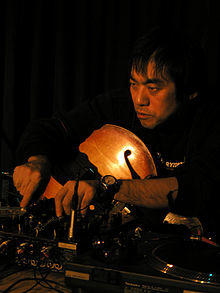Ground Zero | |
|---|---|
| Origin | Tokyo, Japan |
| Genres | |
| Years active | 1990–1998 |
| Labels |
|
| Past members |
|
Ground Zero was a Japanese noise/improvisation band[1] during the 1990s led by the guitarist and "turntablist" Otomo Yoshihide that had a large and rotating group of performers with two other regular performers.[1]
History
Ground Zero was formed to play the John Zorn game piece Cobra.[2] They first played in August 1990 and last played in March 1998.[2] The band's last project was in 1998 when they re-worked material from a 1992 Cassiber concert in Tokyo; it was released on the second CD of Cassiber's double CD, Live in Tokyo (1998).
Musical style
The band performed on such instruments as turntables, sampler, shamisen, saxophone, koto, omnichord, electric guitar and two drum kits. They were the first free improvising musicians to use turntables[3]
Their music mixed free jazz, improvisation, pop, rock and experimental noise.[2] Their album Revolutionary Pekinese Opera ver. 1.28 is a sound collage piece combining noise music and samples of peking opera and Consume Red, on which the performers improvise around a short sample of hojok music played by the Korean holy musician Kim Seok Chul.
Discography

Studio albums
- Ground Zero (1992)
- Null & Void (1995)
- Revolutionary Pekinese Opera (1995)
- Revolutionary Pekinese Opera Ver. 1.28 (1996)
- Consume Red (1997)[2]
- Plays Standards (1997)
Compilation albums
- Conflagration (1997)
- Consummation (1998)
Live albums
- Last Concert (1999)[1]
- Live 1992+ (2007)
Singles
- "Live Mao '99" (1995) (split with Bästard)
- "Revolutionary Pekinese Opera Ver. 1.50" (1996)
References
- ^ a b c Jenkins, Todd S. (2004). Free jazz and free improvisation: An encyclopedia. Westport, Conn.: Greenwood. p. 165. ISBN 9780313298813.
- ^ a b c d Kelly, Caleb (2009). Cracked Media: The Sound of Malfunction. MIT Press. p. 188. ISBN 978-0-262-01314-7.
- ^ Christoph Cox, Daniel Warner (2004). Audio culture: readings in modern music. Continuum International Publishing Group. p. 405. ISBN 9780826416155.
External links
- Ground Zero at AllMusic
- Ground Zero discography at Discogs
- Ground-Zero at Improvised Music from Japan